We continue our Blog series about the 2020 Delegates and how they have been faring since Washington Week was canceled due to the global pandemic. Two outstanding student leaders are selected to serve as USSYP delegates from each state in the nation, as well as the District of Columbia and the Department of Defense Education Activity. Learning of the breadth and beauty of our country as they share home state stories and photos is one of the profound gifts of the program. We applaud all of our 2020 students who contributed to this blog series.
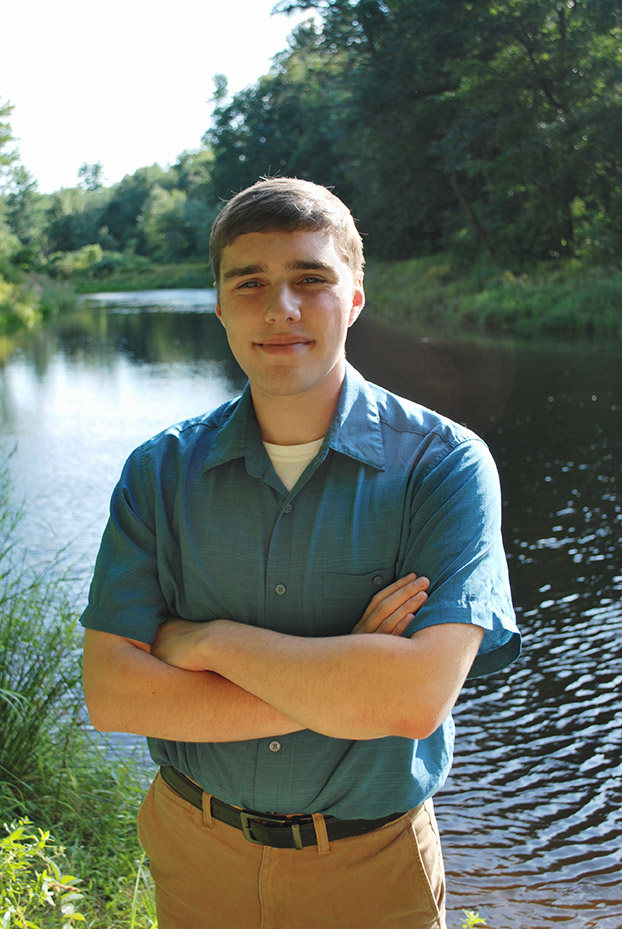
“I’ve learned more than ever that trust is essential. Trust makes it so people have faith in what you are doing. For that trust to be created you have to be approachable and institutionalize accessibility so that there are opportunities for trust to be built.”
USSYP: What has been happening in your life since the announcement of the pandemic?
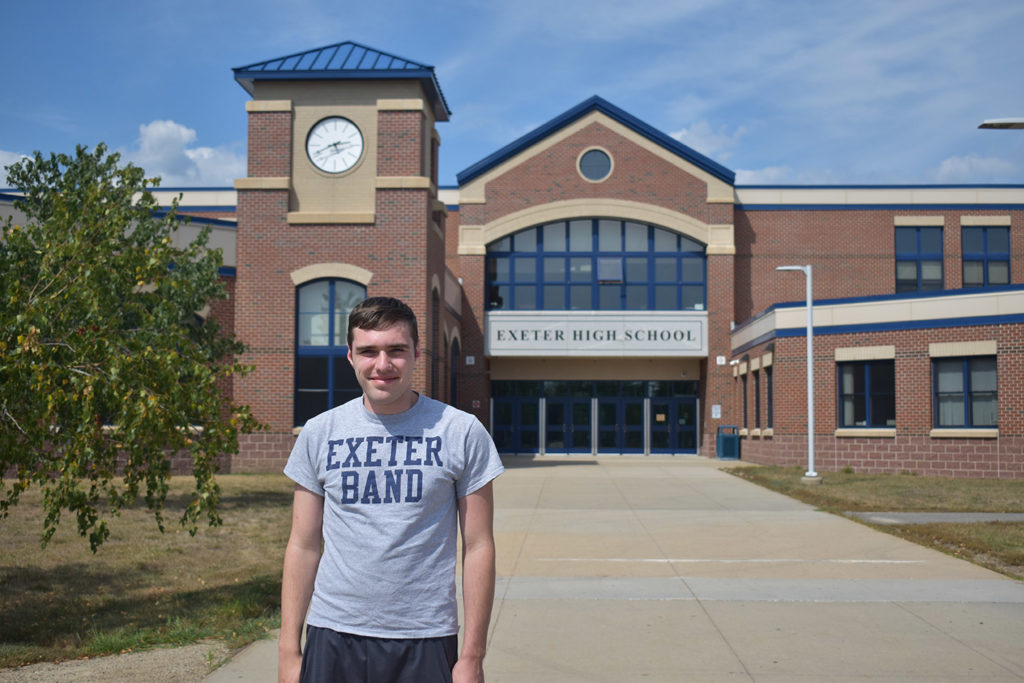 2020 New Hampshire delegate Sawyer Rogers at Exeter High School
2020 New Hampshire delegate Sawyer Rogers at Exeter High School
I am Sawyer Rogers from the town of Kensington, New Hampshire, located 15 minutes from the ocean and an hour from Boston and the White Mountains. I attended Exeter High School, a public school with 1,700 students who come from six nearby towns. During the early part of the pandemic, I kept myself busy. As my high school senior class president, I brought leadership and guidance at a time where nobody knew exactly what to do. Senior activities were canceled adding to the many emotions that seniors were already having with the pandemic. I personally reached out to many seniors to check-in and directed the class officers to do the same. From this we got a read on how seniors were feeling and then once we were able, we began to reimagine many of the senior activities that had been canceled. This resulted in pick-up days, virtual events, and an in-person graduation with all of the graduates and limited guests only a week later than originally planned.
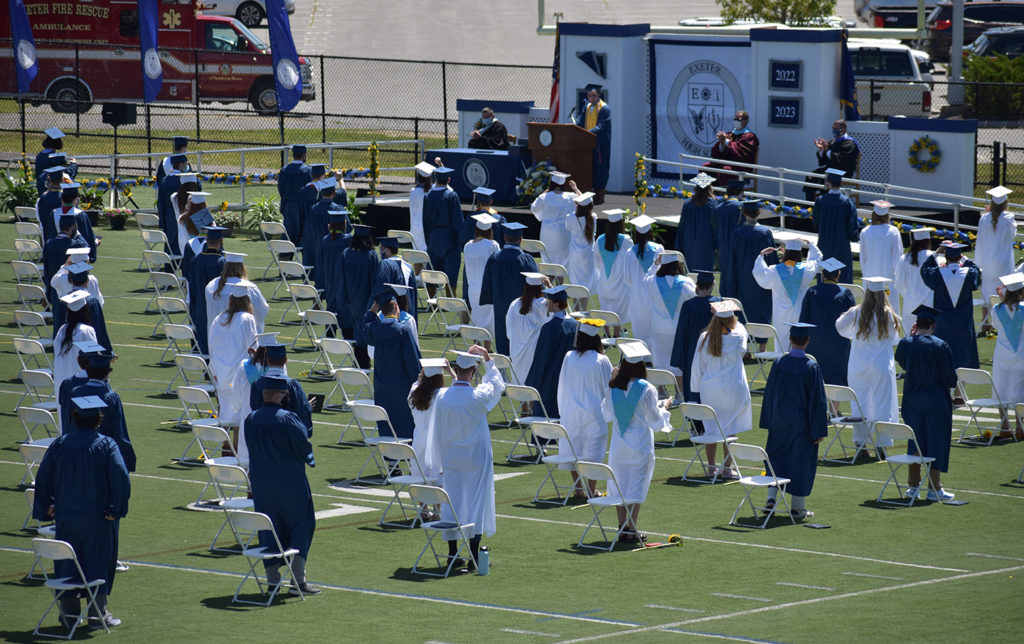
Outdoor graduation, Exeter High School
I also went nearly full time at my job at RiverWoods: Exeter, a retirement community and nursing facility. I worked as a dining room host in independent living. My job before the pandemic consisted of directing servers in the dining room and seating residents. Once the pandemic hit, the dining room closed, and we shifted to simply “to-go” food service for all our residents. The facility also went into lockdown meaning only staff could enter and leave. Our independent residents now had to depend solely on the facility for all their needs. This consisted of everything from groceries to social interactions.
All of that was going on while I also had to keep up with my schoolwork, that included completing classes for my early college program so I could complete my Associates in Liberal Arts from Southern New Hampshire University prior to high school graduation. Also, as a student trustee at the Exeter Historical Society, I assisted in transitioning the society into a pandemic mode of operation. Finally, as a member of the New Hampshire Teacher of the Year Committee, I had the opportunity to review the applications of numerous amazing teachers and then select a winner. These applications illustrated how these teachers were teaching before and during the pandemic.
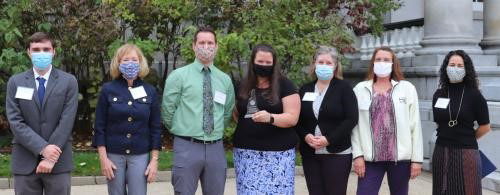
Sawyer Rogers (left) and members of the New Hampshire Teacher of the Year Selection Committee announce the 2021 NH Teacher of the Year.
After graduation things slowed down for me. I continued working and spent much of my free time enjoying the outdoors. In July I partook in the National Security Language Initiative for Youth Virtual Turkish Program run by the State Department. Originally, I was supposed to be in Turkey studying the Turkish language and culture but due to the pandemic, the program was converted to an online format.
USSYP: Have there been any instances where your natural inclinations toward leadership and service have shone through?
I’d say my role as class president was really where my leadership shone through. I had been my class’ president for all four years and this pandemic challenged me in ways I had never experienced before. I had always relied on running into my peers in the hallways to get a sense of how people felt about what the class was doing and what they felt they needed from it. No longer was that possible. This shift in my communication style to solely virtual was made more difficult with events being canceled. Class officers spent the majority of our time trying to communicate and create new events to replace those that had been canceled.
I split the end of my senior year into two periods. The first one I’ve dubbed the period of “Uncertainty” which started in March and ended in early May. Everything was in flux. Stay at Home Orders were constantly being extended so we couldn’t plan that far into the future. We simply didn’t know what the future was going to look like. Emotions of anxiety, frustration, disappointment, and lack of control were rampant during this time.
So, I decided to direct the class government towards our peers. To check-in with seniors and see what they needed and wanted. Reaching out virtually had amazing results to help each other get through the uncertain time while getting a good read on what seniors wanted most when it came to senior activities.
The second period I call “The Light at the End of the Tunnel” which started in mid-May and ended at graduation in mid-June. This all began when we got word from the state and our administration that events, as long as they followed the CDC and state guidelines, could begin happening. This of course got me, all of the class officers, and seniors excited. Finally, we could begin putting things in motion. We could tell people the date, the time, the place and the plan. We organized pick-up days so that seniors could get their yearbooks, caps and gowns, and other senior goodies. The most valuable part of this though was being able to see our high school community. To see our classmates, teachers, administrators, and staff. Even if it was through a car window it was worth it and lifted many spirits. Another event we put together was a virtual class day. Clips of speeches, awards, and skits were submitted and compiled to create a video reflecting our years together as a class.
Over our four years of high school, my class had built upon our reputation for being respectful, responsible, kind, and hard-working. Because of this, our administration trusted us and therefore worked so hard to put together an in-person graduation for us. And for their hard work we are forever thankful. The result of this effort was our graduation being as close to a normal one as it could be. I am proud to say that our graduation was one of the first in-person graduations in New Hampshire and became the model for other schools.
We had our graduation only a week later than originally planned, in our stadium, with our whole class of 411 students together, and each student able to bring 2 guests. Everyone had to be health screened, wear masks, and be 6 feet apart. Graduation happened safely and successfully. This closure for my class was attained all thanks to the open lines of communication established, the hard work and planning to execute innovative ideas, and the trust and reputation the class had earned and lived up to.
USSYP: Has the pandemic had any positive effects in your life? Have you taken up a new hobby or read any books during this unusual excess of time that you can share or recommend? What do you feel you have learned from this experience so far?
I’ve learned more than ever that trust is essential. Trust makes it so people have faith in what you are doing. For trust to be created you have to be approachable and institutionalize accessibility so opportunities for trust are built. And then show respect and care to others when those opportunities occur.
USSYP: Have you had the opportunity to work with any outside groups, nonprofits or other organizations to effect positive change during this time?
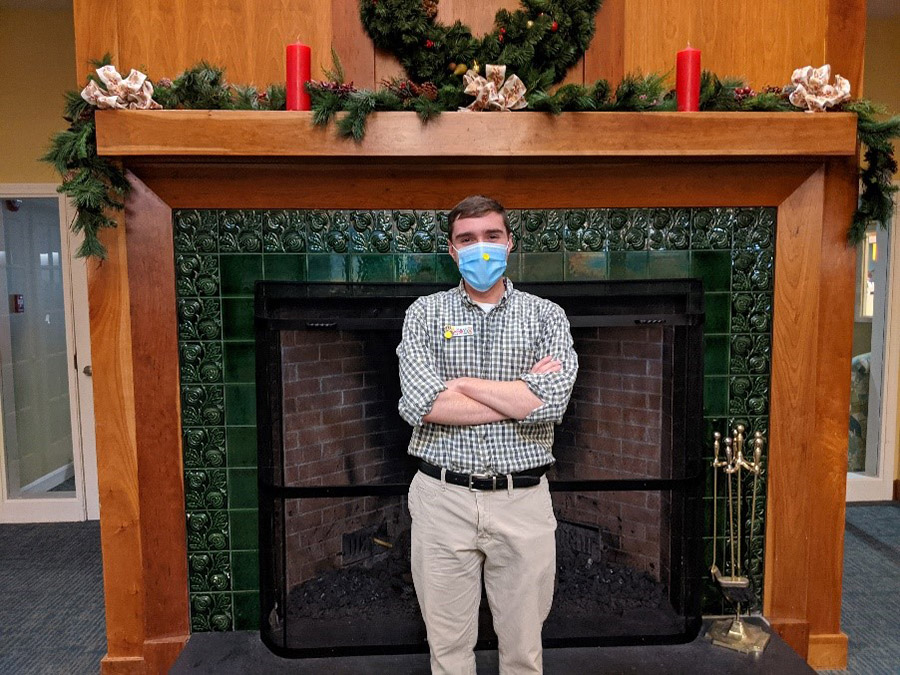
Sawyer Rogers in the Woods Dining Room at Riverwoods:Exeter
Working at RiverWoods: Exeter, a retirement community and nursing facility, has allowed me to create positive change during the pandemic. I have been employed there for three years starting as a dining room server and then working my way up to the position of dining room host. Before the pandemic, the host would seat residents and direct servers. When the pandemic happened, the facility went into lockdown – meaning residents couldn’t leave the facility and the dining room was closed. A typical day would consist of two sessions, one in the morning and one in the afternoon, to prepare, package and deliver “to go” meals. In between these times, I’d staff the newly created grocery store or we’d work on processing the menus. On average we did around 200 meals a day.
It was a difficult time for everyone and the elderly population was one hit the hardest during this time. Not only are they one of the most vulnerable populations to the virus but they were also unable to leave the facility. They were not able to physically see their families and would constantly hear the horror stories of COVID clusters in other retirement and nursing facilities. A large part of my job had always been about caring for the residents. But when the pandemic hit the need for care increased. I became one of the few people residents could interact with. I provided them with food, but more importantly, I was someone they could talk to. This helped them get through and it helped me as well.
USSYP: Did you have an opportunity to partake in Washington Week ONLINE, and if so, which speakers and events were most impactful for you?
I was able to participate in all of the Washington Week Online sessions. The most moving speakers for me were the National Institutes of Health director, Dr. Francis Collins and Senator James Lankford. Dr. Collins was approachable, and I could tell when he spoke to us that he truly wanted to speak with us. He showed me that people in positions of power can still be genuine. Senator James Lankford was down to earth. He explained to us why he decided to pursue public office and it made me realize how important it is to remember the initial reasons why you decide to dedicate yourself something.
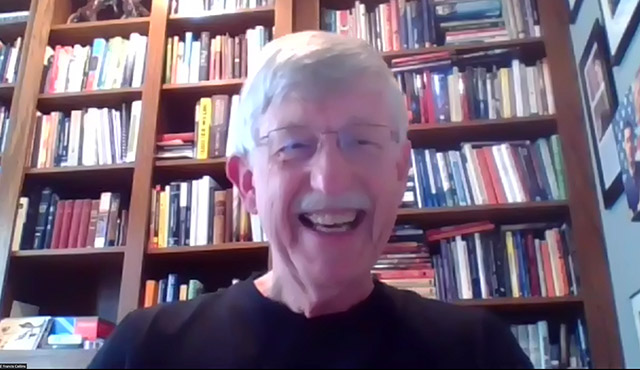
Dr. Francis Collins, Director of the National Institutes of Health, participates in 2020’s Washington Week Online
© Photo by Jakub Mosur and Erin Lubin
USSYP: Technology has made it possible for you to know and be engaged with your fellow 2020 delegates. Have you formed friendships or special connections?
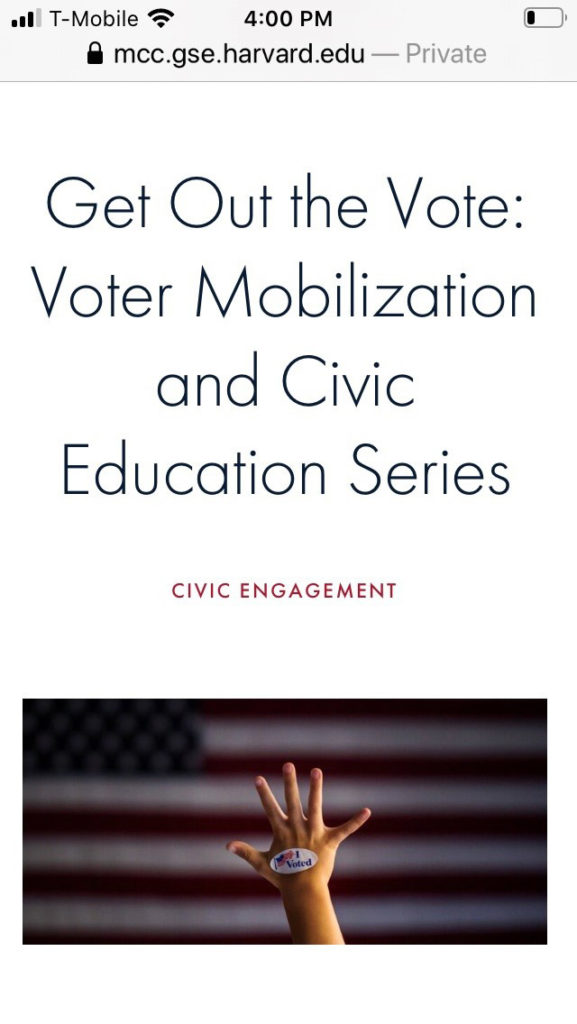
One of my USSYP classmates, Tarun Amasa (CO – 2020), worked with Harvard professors to create a new initiative for voter mobilization: “Get Out the Vote: Voter Mobilization and Civic Education Series at Harvard’s Making Caring Common.” He encouraged many from the USSYP community to apply. I took part in the initiative and got to meet Tarun as well as some of my other USSYP classmates as we discussed voter mobilization. It was a terrific experience to have had and helped us craft ideas on how to encourage people to vote.
USSYP: Please tell us about your plans for college this fall. Has the experience of the pandemic changed any of your original thoughts for your future?
I have just wrapped up my in-person Fall Semester at the University of New Hampshire where I am a double majoring in Political Science and History. My university is one of the leaders when it comes to operating in a COVID world. They set up a robust in-house testing program and facility where all students are tested twice a week, and all staff and faculty once a week. This robust program allowed for us to have a good and healthy semester despite all the limitations that COVID-19 has placed on the world.
While at the University of New Hampshire, I was elected as a Student Senator. I serve on the Health and Wellness Council which deals with issues ranging from dining to COVID. I also got an on-campus job as a bus driver and I am working towards getting my Commercial Driver’s License. While on break, I have returned to work at Riverwoods: Exeter as we go through yet another wave of COVID.
After my undergraduate program, I intend to pursue a Masters in either Public Administration or Public Policy. I don’t have anything planned for certain beyond that, but one thing I know is that no matter what I do in my life I want to help people in some capacity.
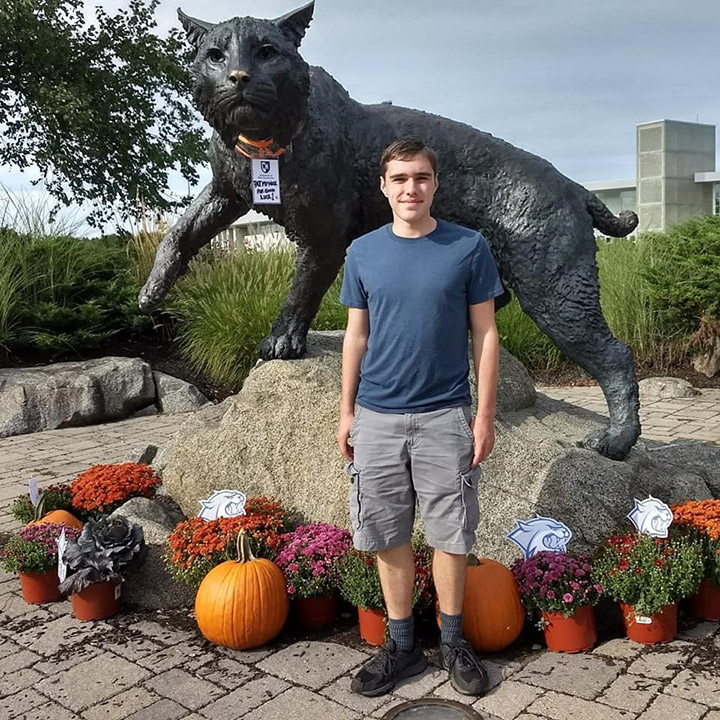
Sawyer Rogers in front of the Wildcat Statue at the University of New Hampshire
